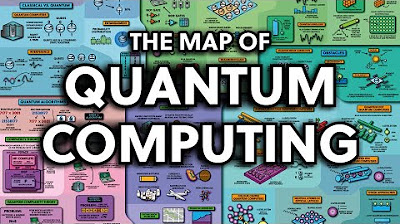Your Guide to 100+ Qubits: Quantum Computing in Practice
Summary
TLDRThis video delves into the potential of quantum computing, highlighting its advantages over classical computing in fields like material science, chemistry, optimization, and data analysis. It introduces key algorithms, including QAOA, and explores how quantum computers can identify structure in messy data and perform complex simulations. The speaker emphasizes the exciting possibilities for quantum computing, which, like classical computing before it, promises to revolutionize industries. The lecture also suggests that we are at the dawn of a new era, one where quantum computing can open doors to unexplored areas of technology and innovation.
Takeaways
- 😀 Quantum computing is moving from theoretical to practical applications, becoming increasingly useful in real-world problems.
- 😀 Quantum computers with over 100 qubits are starting to show potential beyond classical systems, especially for problems too complex for classical simulation.
- 😀 Quantum computing is a natural progression in the long history of computing, offering a new tool for solving problems that classical computers struggle with.
- 😀 The main application areas of quantum computing include material science, chemistry, search optimization, and data analysis.
- 😀 Quantum computers excel in simulating molecular and atomic interactions, which is crucial for material science and chemistry.
- 😀 Search and optimization tasks can be improved using quantum algorithms like QAOA, which combines classical and quantum computation for better efficiency.
- 😀 Quantum machine learning has the potential to extract patterns and structure from messy data that classical computers cannot easily process.
- 😀 The rise of quantum computing reflects a growing ability to harness the natural world’s complexity for computational tasks, building on previous technological advances.
- 😀 Quantum computing provides opportunities for discovering new features and patterns in data, significantly impacting industries like AI and big data.
- 😀 Just as the early pioneers of classical computing couldn't predict the future, today's quantum computing pioneers are shaping an uncertain but promising future.
- 😀 The development of quantum computing continues to be an exciting frontier, with vast potential to change industries and our understanding of computation.
Q & A
What is the key difference between quantum computing and classical computing?
-Quantum computing relies on qubits, which can exist in multiple states simultaneously due to quantum superposition and entanglement, while classical computing uses bits that are either 0 or 1.
Why is quantum computing often viewed as the next chapter in the long history of computing?
-Quantum computing represents the next evolution in our quest to harness natural phenomena for computational purposes, continuing the trend of improving our ability to solve complex problems that classical computers cannot handle.
What are some real-world applications of quantum computing?
-Quantum computing has applications in simulating molecular and atomic interactions, solving optimization problems, and quantum machine learning, including tasks like pattern recognition and feature extraction in messy data.
What challenges does quantum computing face today?
-Quantum computers are currently prone to noise and errors, which can affect their computations. However, error mitigation and correction strategies are being developed to address these challenges.
How does quantum computing enhance material science and chemistry?
-Quantum computers can simulate molecular and atomic interactions more accurately than classical computers, which is valuable for developing new materials and advancing chemical research.
What is the Quantum Approximate Optimization Algorithm (QAOA)?
-QAOA is a hybrid classical-quantum algorithm used for optimization tasks. It leverages classical computers to find optimal parameters for a quantum circuit, improving the efficiency of solving optimization problems.
How does quantum machine learning differ from classical machine learning?
-Quantum machine learning uses quantum computers to process large and complex datasets more efficiently, identifying patterns and extracting features from messy data, a task that can be more challenging for classical computers.
What is the significance of IBM Quantum's 100-qubit systems?
-IBM Quantum’s 100-qubit systems are an important milestone, as they bring quantum processors with enough qubits to tackle real-world problems, although they are still subject to noise and errors that need to be addressed.
What does 'quantum utility' refer to?
-'Quantum utility' refers to the point where quantum computers can outperform classical computers in solving specific, real-world problems, despite current limitations in noise and error rates.
How might quantum computing influence industries in the future?
-Quantum computing could transform industries such as healthcare, logistics, finance, and energy by solving complex optimization problems, improving machine learning, and simulating molecular structures for material and drug development.
Outlines

Esta sección está disponible solo para usuarios con suscripción. Por favor, mejora tu plan para acceder a esta parte.
Mejorar ahoraMindmap

Esta sección está disponible solo para usuarios con suscripción. Por favor, mejora tu plan para acceder a esta parte.
Mejorar ahoraKeywords

Esta sección está disponible solo para usuarios con suscripción. Por favor, mejora tu plan para acceder a esta parte.
Mejorar ahoraHighlights

Esta sección está disponible solo para usuarios con suscripción. Por favor, mejora tu plan para acceder a esta parte.
Mejorar ahoraTranscripts

Esta sección está disponible solo para usuarios con suscripción. Por favor, mejora tu plan para acceder a esta parte.
Mejorar ahoraVer Más Videos Relacionados

Les Ordinateurs Quantiques

Computação Quântica - Fundamentos e Aplicações - Aula 07

Quantum Computing: What, Why, and What for

The Map of Quantum Computing - Quantum Computing Explained

🚀 KOMPUTER KUANTUM Menggegerkan DUNIA 🌍 Dengan Kecepatan Ekstrem ⚡

క్వాంటం సైన్స్ తో కంప్యూటర్ విప్లవం ఎలా ? || Computer Revoluation With Quantam Science ||
5.0 / 5 (0 votes)
